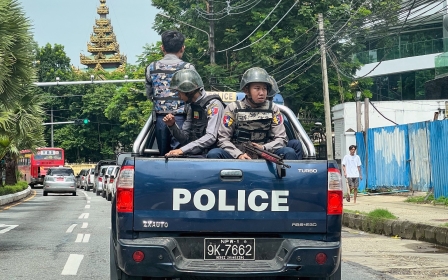'War isn't going away soon': Campaigners defy UK law to protest at arms fair

Anti-arms campaigners are protesting against the Defence and Security Equipment International (DSEI) expo, as the arms fair returns to London for the first time since the British police received new powers to handle and disperse protesters.
Earlier this year, the UK government passed the Public Order bill, which gave police new powers to arrest and disrupt certain types of protest.
These powers include arresting anyone suspected of locking or glueing themselves to an object, and slow walking in traffic that would disrupt transport networks and roads.
The legislation also extends stop and search powers and the issuing of protest banning orders that prohibit individuals from attending any act deemed a protest.
But despite these powers, activists have continued with their two weeks of "resistance" against the DSEI, which hosts approximately 2,800 defence and security suppliers and takes place every two years at London's Excel Centre.
Stay informed with MEE's newsletters
Sign up to get the latest alerts, insights and analysis, starting with Turkey Unpacked
The fortnight of protests aims to target the preparation of the event and the exhibition days itself between 12-15 September.
The DSEI is supported by the UK government’s Defence and Security Organisation (DSO) and features representatives from an array of private companies and governments, including many engaged in routine human rights abuses, according to anti-arms trade campaigners and human rights organisations.
Among the countries from the Middle East and North Africa listed as attending the DSEI, according to a list published by the UK's Defence and Security Exports, include Algeria, Bahrain, Egypt, Iraq, Israel, Jordan, Kuwait, Morocco, Saudi Arabia, Oman, Qatar, Turkey and the United Arab Emirates.
The DSEI is regularly the target of protesters who accuse it of normalising the sale of weapons to despotic governments.
Emily Apple, who works for the Campaign Against the Arms Trade (CAAT), has opposed the DSEI for 24 years. She believes the police are not interested in "facilitating" protests and are "only interested in protecting the arms dealers".
'DSEI is a marketplace in death and destruction'
– Emily Apple, Campaign Against the Arms Trade
"One of the chilling effects of the new legislation is that people, wrongly, view all protest as illegal. This is not the case, and it's important that people realise that they do still have the right to demonstrate," Apple told Middle East Eye.
"There are some issues where the consequences of not acting are so severe that people are willing to risk arrest to try to stop them happening... DSEI is a marketplace in death and destruction," Apple added. "The deals done at the Excel Centre will literally kill people. War starts at DSEI, and it can be stopped there too.
"[And] despite the new legislation, campaigners are very aware that the repression we face in this country is nothing compared to the repression faced by those in human rights-abusing countries such as Saudi Arabia, Bahrain and Turkey that the UK is courting deals with at DSEI.
"We owe it to these people to continue taking action and doing whatever it takes to stop DSEI."
Vigil for Palestine
Last Tuesday, dozens of people gathered outside a park opposite the Excel Centre to hold a vigil for Palestine as trucks delivered exhibits for the arms fair. Police patrolled the perimeter of the Excel Centre and filmed people attending the vigil.
Since then, CAAT confirmed that police arrested nine campaigners after they attempted to stop the delivery of weapons scheduled to be exhibited at the DSEI. CAAT said the police have since released the detained protesters.
Kevin Blowe, of police monitoring group Netpol, told MEE that police had been searching bushes and looking for locks since anti-arms campaigners began launching their fortnight of resistance.
Blowe believes the new protest laws have further emboldened activists to keep protesting against the arms industry.
"We talk to activists who take part in civil disobedience and they say the introduction of these new laws shows how effective direct action and civil disobedience is now," he said.
"People are saying their tactics are working, and it's not like the climate crisis or injustices like the arms trade and war are going to go away any time soon.
"It was inevitable that people would protest. People's motivations have not changed for the last two decades, and we are here as a matter of morality."
Middle East Eye delivers independent and unrivalled coverage and analysis of the Middle East, North Africa and beyond. To learn more about republishing this content and the associated fees, please fill out this form. More about MEE can be found here.





